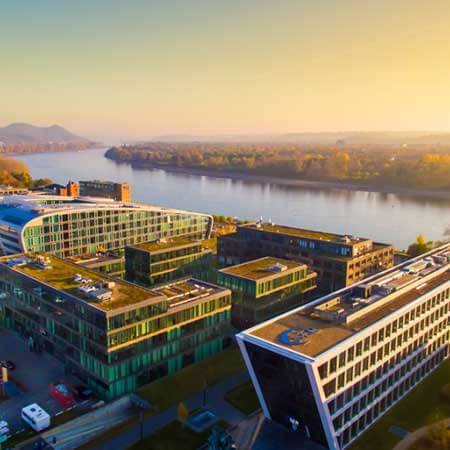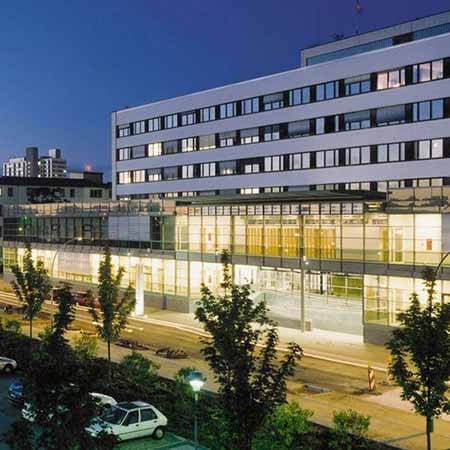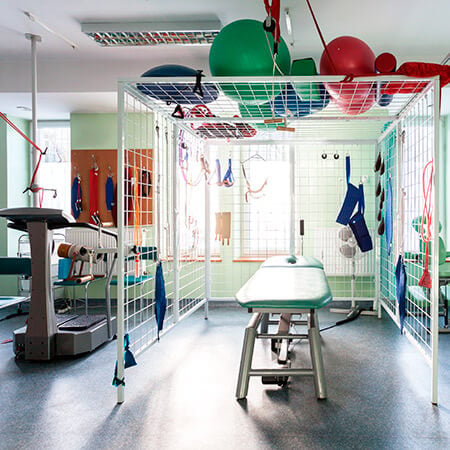Parkinsons disease
Due to the difficulties associated with the organization of treatment in Turkey, Switzerland, South Korea and India, we are not currently processing requests to these regions.
If you are interested in treatment in Germany, please leave a request and our specialists will contact you as soon as possible.
Parkinson’s disease is a progressive chronic illness of the central nervous system which is manifested by motor disorders. Parkinson’s disease mostly affects elderly people. Nevertheless, young people can have it as well, even if the person is under 20 years old. Without timely treatment, Parkinson’s disease leads to disability and reduces the patients’ life expectancy.
The Booking Health portal presents 63 German clinics specializing in Parkinsons disease treatment
Show all clinics
Parkinson’s disease – Diagnostics
Diagnosis can be confirmed during the clinical examination, without imaging methods. But doctors need to differentiate Parkinson’s disease from parkinsonism. Parkinsonism is a state of health that has identical symptoms, but they are caused by other illnesses or external factors.
Thus, Parkinson’s disease diagnostics is held in 3 stages:
- Detection of parkinsonism symptoms
- Search for clinical signs that could exclude Parkinson’s disease
- Search for symptoms that could confirm Parkinson’s disease
Diagnosis is established on the basis of two symptom groups. The first group is hypokinesia. The second one includes at least one of the following signs:
- Rigidity
- Resting tremor
- Postural violations
Additional criteria for Parkinson’s disease diagnostics are:
- A positive effect after administration of levodopa
- The disease is progressing
- A patient is sick for more than 10 years
- The disease has started on one side of the body
- Asymmetry on one side of the body is more expressed than on the other one
Best clinics for the Parkinson’s disease diagnostics in Germany:
Parkinson’s disease – Treatment
Parkinson’s disease is treated with conservative methods and surgery. Particular medicines are prescribed in order to slow down the progression of the pathology and to eliminate basic symptoms. Drug-free measures are also performed for treatment, like massage, physiotherapy, acupuncture, exercise therapy and others.
Surgery can help to reach stable improvement of patient’s health condition. The following operations are performed for the treatment of Parkinson’s disease:
Thalamotomy is performed to eliminate one-sided tremor. Ventral intermediate nucleus of the thalamus is destroyed during the surgery. Effectiveness of this type of intervention in the best hospitals (German, Swiss) is 97%. Average risk of the stable complications is 10-15%. Basically, it depends on the surgeon’s skills and quality of the medical equipment.
The aim of pallidotomy is the reduction or elimination of the movement disorder. A needle is injected into the frontal part of the brain (globus pallidus). This intervention is considered to be the safest among the surgeries. Stable or transient neurological violations are rare. Some German hospitals perform a pallidotomy with the help of radiosurgery that helps to avoid tissue trauma and makes surgery even safer.
Neurostimulation. Particular brain structures are irritated by electricity. Stimulation has to be constant, that’s why a neurostimulator is implanted into the patient’s body during the surgery. Electrodes are implanted into the brain. The device is usually placed under the collarbone. This is an expensive, but very effective surgery. It is desirable to perform this surgery in the best hospitals in Europe in order to minimize the risk of electrodes displacement and breakage of the device. Otherwise, you will have to perform the surgery again.
Parkinson’s disease – Innovative treatment
New methods of treatment are always being developed. They can significantly improve the quality of life of patients with Parkinson’s disease. Following techniques are being developed for these purposes:
- Stem cells treatment. Neurons are obtained from the patient’s own stem cells and transplanted into the patient’s brain. Stem cells are taken from the peripheral blood, then cultured and differentiated. As a result, they replace dead dopamine-releasing cells. Stem cells treatment helps to reduce the symptoms for several years in the great number of patients.
- Genetic vectors. Nucleic acid molecules are injected into the patient's subthalamic nucleus. Molecules contain genes responsible for the glutamic acid decarboxylase enzyme formation. As a result, activity of the subthalamic nucleus decreases and Parkinson’s disease symptoms are reduced.
- Immunotherapy. PD01 vaccine is now at clinical trial stage. Vaccine stimulates the formation of antibodies to α-synuclein and inhibits its formation which reduces the manifestations of Parkinson’s disease.
Best clinics for the Parkinson’s disease treatment in Germany:


Parkinson’s disease – Rehabilitation
The most modern rehabilitation programs are used in Germany. They are adapted individually for each patient, and are based on the disease stage, age, physical possibilities, and the results of treatment. Different specialists such as: therapists, neurologists, psychologists, rehabilitators, kinesiotherapists, physiotherapists are involved in the rehabilitation process.
The following methods of rehabilitation are used:
- Dosed physical activity
- Training on the simulators and in the pool
- Individual orthoses
- Physiotherapy
- Acupuncture
- Manual therapy
- Transcranial magnetic stimulation
- Natural factors of the nature (mud, thermal waters, etc.)
- Individual or group therapy with a psychologist
Rehabilitation may include medicamentous support. It is necessary to hold a consultation with the patient about the proper nutrition and the way of life which is important for him in the current situation.
Rehabilitation programs in Germany are designed for 2 weeks. If necessary, they can last much longer. In this country, the patient is provided with qualitative care, accommodation in comfortable rooms and individually selected meals.
Rehabilitation programs in Germany show one of the best results in the world. Most patients successfully restore their working capacity and excellent health there. They remain physically active, return to the full social and family life.
Best clinics for neurological rehabilitation in Germany:
Authors:
The article was edited by medical expert, board certified Dr. Nadezhda Ivanisova. For the treatment of the conditions referred to in the article you must consult a doctor; the information in the article is not intended for self-medication!
Sources:
Journal of Neurology, Neurosurgery and Psychiatry
The cost of services includes
Here you can find the cost of treatment for this disease at the German University Hospitals. Leave a request and we will provide a free consultation with a doctor and will start organizing the whole treatment process.
The program includes the following:
- Issuing of an invitation for getting a visa for treatment as quick as possible
- Fixing an appointment at a time convenient for you
- Preliminary organization of a comprehensive examination and discussion of the forthcoming treatment plan
- Arranging transfer from the airport to the hospital and back to the airport
- Provision of interpreting services and services of a personal medical coordinator
- If necessary, assistance in the organization of further surgical treatment
- Provision of a medical insurance against treatment complications covering up to 200,000 euro
- Preparation and translation of medical records and recommendations from the hospital
- Assistance in the subsequent communication with your attending physician, including consultations on repeated X-ray images through the unique medical document management system E-doc



